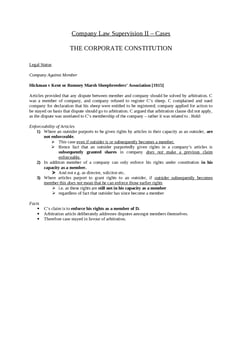Regentcrest v Cohen [2001] 2 BCLC 80; [2001] 2 BCLC 319
Judgement for the case Regentcrest v Cohen
Table Of Contents
KEY POINTS
Directors have a fiduciary duty to act in the best interests of the company and its shareholders, which includes the duty of loyalty, care, and avoiding conflicts of interest. A breach occurs when a director acts in a way that harms the company, such as self-dealing or ignoring conflicts of interest.
If a director votes in favor of waiving a company's claim against share vendors under a share sale agreement, and the company soon goes into liquidation, this might suggest a breach of fiduciary duty. The director's decision could indicate a conflict of interest or a failure to consider the company's welfare.
-
To assess whether a director breached their fiduciary duty, courts look at the following:
Duty of Care: Did the director gather sufficient information and act with due diligence?
Duty of Loyalty: Was there a conflict of interest, and was it disclosed and managed properly?
Duty of Good Faith: Did the director act with honesty and genuine belief in the company's best interests?
If the director failed to meet these standards, they might be held accountable for damages or face other legal consequences.
FACTS
-
Regentcrest plc, (“The Claimant Compan”), a property developer, went into liquidation in November 1990.
Before that, in 1985, Mr Don Richardson and his brother Mr Roy Richardson (“Second Defendant and his brother”) acquired a 29.9% stake in the company and became directors.
In 1988, the Claimant bought all shares in Greenground Ltd, a company owning a £4.2 million piece of development land.
The share sale agreement contained a "clawback provision," which required the vendors to pay back any decrease in Greeground Ltd's net asset value at the completion of a proposed development.
Due to market conditions, the development never occurred, but practical completion was deemed to have happened on August 15, 1990.
Had the clawback provision been enforced, it would have resulted in a £1.5 million claim against the vendors.
By early 1990, the Claimant faced financial troubles from the commercial property market collapse.
The second Defendant and his brother acquired the remaining shares in the claimant for £5.7 million and invested another £5 million to support cash flow.
On September 5, 1990, the Second Defendant and his brother voted to waive the £1.5 million clawback claim in exchange for free services from the vendors.
On September 17, 1990, a winding-up petition was filed, leading to a compulsory liquidation order on November 21, 1990.
-
The Claimant company's liquidators then sued the second Defendant for breach of fiduciary duty, claiming that waiving the clawback claim was against the company's interests and amounted to disposing of a valuable asset for negligible consideration.
They alleged that the Second Defendant and his brother's decision to waive the claim was to protect the vendors and not the company.
JUDGEMENT
-
The court held that the duty imposed on directors to act bona fide in the interests of the company was subjective in nature.
This means that the question is whether the director genuinely believed that their action or omission was in the company's best interests.
While it may be more challenging for a director to convince the court of this belief when the action or omission causes substantial harm to the company, the subjective nature of the test remains unchanged.
-
In this case, it was evident from the second Defendant's testimony that there were valid commercial reasons behind his decision to agree to the waiver of the clawback claim.
Furthermore, he genuinely believed that by voting in favor of the resolution for waiver, he was acting in the best interests of the Claimant company.
Therefore, the claim of breach of fiduciary duty against him failed.
COMMENTARY
Directors have a fiduciary duty to act in the best interests of their company, which includes being loyal, and careful, and avoiding conflicts of interest.
-
A breach happens when a director's actions harm the company, such as through self-dealing or failing to disclose a conflict.
Courts evaluate breach claims by looking at whether the director acted in good faith and genuinely believed their decision was best for the company.
ORIGINAL ANALYSIS
-
Test for good faith (under pre-2006 law) is entirely subjective
However the greater the detriment caused to company, harder it will be for Defendant to show he acted in good faith
RELATED CASES
For Further Study on Regentcrest v Cohen
Need instant answers? Our AI exam tutor is here to help.
Ask questions 🙋 Get answers 📔 It's simple 👁️👄👁️
Our AI is educated by the highest scoring students across all subjects and schools. Join hundreds of your peers today.
Get StartedSimilar Cases
Related Product Samples
These product samples contain the same concepts we cover in this case.
| Contract Law | Contents Of Contracts Interpretation Consumer Rights Implied Terms Notes (67 pages) |


